|
Books Should Be Free Loyal Books Free Public Domain Audiobooks & eBook Downloads |
|
|
Books Should Be Free Loyal Books Free Public Domain Audiobooks & eBook Downloads |
|
Satires |
|---|
Book type:
Sort by:
View by:
|
By: Allan Monkhouse (1858-1936) | |
|---|---|
 Mary Broome
Mary Broome
Before Downton Abbey, there was Mary Broome. In Allan Monkhouse's 1911 satire, when the son of a middle-class household gets their housemaid pregnant, the two families must try to combine their very different values. | |
By: Aristophanes (446-389 BCE) | |
|---|---|
 Acharnians (Billson Translation)
Acharnians (Billson Translation)
Loaded with cryptic, nearly indecipherable inside jokes and double entendres, this early comedy of Aristophanes has a simple, anti-war premise that resounds down the centuries. On flimsy pretexts, greedy politicians have embroiled the nation of Athens in war after war after war. Dicæopolis is Everyman, an ordinary, plain-speaking citizen fed up with the bumbling, belligerence, and insincerity of the professional leaders. He decides on a whim to make a separate peace with Sparta all by himself, returning with a treaty good for thirty years... | |
By: Don Marquis (1878-1937) | |
|---|---|
 Danny's Own Story
Danny's Own Story
Danny is the proverbial basket-on-the-doorstep baby, found by Hank and Elmira Walters, a childless couple who welcome him into their home because they need a new topic over which to bicker. Bicker they do, and fight just as often, from the day they attempt to settle on a name, to the day eighteen years later, when Danny and Hank come to blows and Danny leaves home in company with Dr. Kirby, bottler and supplier of the miracle elixir, Siwash Indian Sagraw. For years Danny wanders aimlessly--from Illinois to Indiana to Ohio, back to Illinois, then into Tennessee and points south--sometimes in company with Dr... | |
By: George Calderon (1868-1915) | |
|---|---|
 Cinderella
Cinderella
If you are expecting glass slippers and pumpkin coaches, look elsewhere... This is "a pantomime as Ibsen would have written it, if only it had occurred to him to write one." Set on a "bleak and cheerless heath overlooking the fjord" we meet Ibsenesque heroine Mrs. Inquest, her step-daughter Hilda, and her daughter Hedda, who is engaged to be married to the unfortunate Tesman. Thus begins Calderon's hilarious Ibsenesque version of Cinderella. NOTE from the editor of the volume, published in 1922 after Calderon's death: This play is hardly more than a rough draft, written when the idea was fresh and put aside to be worked on when the right moment should come... | |
By: Laurence Oliphant (1829-1888) | |
|---|---|
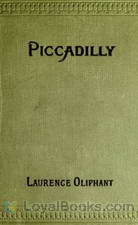 Piccadilly A Fragment of Contemporary Biography
Piccadilly A Fragment of Contemporary Biography
Laurence Oliphant, author, international traveller, diplomatist and mystic, who spent a decade in later life under the influence of the spiritualist prophet Thomas Lake Harris, writes here under the amusing guise of Lord Frank Vanecourt, bringing us a veritable pot-pourri of events from everyday life in 1865 as he moves amongst the great, the good, and not so good who reside in the exclusive area of London's Piccadilly W1 and its surroundings. (Introduction by Nigel Carrington) | |
By: Molière (1622-1673) | |
|---|---|
 Learned Women
Learned Women
| |
By: Plato (Πλάτων) (c. 428 BC - c. 347 BC) | |
|---|---|
 Gorgias
Gorgias
This dialogue brings Socrates face to face with the famous sophist Gorgias and his followers. It is a work likely completed around the time of "Republic" and illuminates many of the spiritual ideas of Plato. The spirituality, as Jowett points out in his wonderful introduction, has many ideas akin to Christianity, but is more generous as it reserves damnation only for the tyrants of the world. Some of the truths of Socrates, as presented by Plato, shine forth in this wonderful work on sophistry and other forms of persuasion or cookery. | |
By: Saki (1870-1916) | |
|---|---|
 Unbearable Bassington
Unbearable Bassington
The Unbearable Bassington was the first novel written by Saki (H. H. Munro). It also contains much of the elegant wit found in his short stories. Comus (The Unbearable) Bassington, is a charming young man about town. His perversity however thwarts all his mother’s efforts to advance his prospects and lands him in hot water. Like many a “black sheep” he ends up being sent off to one of the colonies to fend for himself. This book showcases Saki’s wonderful writing and that ability to be so very funny and terribly sad at the same time. | |
 Westminster Alice
Westminster Alice
Published five years before John Kendrick Bangs had the same idea with Alice in Blunderland, Saki, in his 1902 series of satirical articles, takes an Alice in Wonderland view of British politics, which Alice finds even stranger than events in Wonderland.In all honesty, owing to its extremely topical nature this political satire hasn't worn well, which explains why it has virtually sunk without trace. To appreciate it at all, it's really rather necessary to understand the topical references. I am... | |
By: A. A. Milne (1882-1956) | |
|---|---|
 Not That It Matters
Not That It Matters
More of the witty, wry, and deliciously wicked essays and articles written by Milne. Most people know him as the creator of Winnie The Pooh, but he worked for many years as editor of Punch Magazine and these are some of his best. Not That It Matters is a collection of over 40 of these short stories and articles. Not That It Matters collects his columns for Punch, which include poems, essays and short stories, from 1912 to 1920. Most of his writing pokes fun, both gentle and not so gentle at a variety of topics... | |
By: Aesop (620 BC - 563 BC) | |
|---|---|
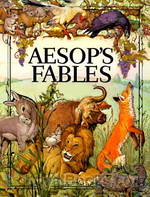 Aesop's Fables
Aesop's Fables
As children, our first experience of the magic of talking animals, the conflict between good and evil, the battle of wits between the cunning and the innocent most probably came from Aesop's Fables. These delightful, pithy and brief narratives are simple, easy to understand and convey their message in a memorable and charming fashion. Aesop's Fables by Aesop consists of about 600 tales, some well-loved and familiar, others less known but just as entertaining and educative and help us map the perimeters of our moral universe... | |
By: Alan Edward Nourse (1928-1992) | |
|---|---|
 Meeting of the Board
Meeting of the Board
| |
By: Aldous Huxley (1894-1963) | |
|---|---|
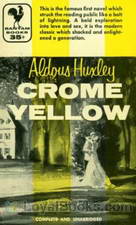 Crome Yellow
Crome Yellow
A shy, introverted young poet. A weekend in a magnificent English country house. A beautiful young lady whom the poet is secretly in love with. An assorted group of guests with varied interests, motives, ambitions and aspirations, and the complex web of history and events that connect all of them. Crome Yellow by Aldous Huxley was his first book, published in 1921, when he was just 27 years old. It is typical of many books written during this period by writers like Thomas Love Peacock and Somerset Maugham, centered round a country mansion and the quaint, British tradition of being invited to spend a weekend with a group of people whom one may or may not know... | |
 Antic Hay
Antic Hay
The epigram to this work from Christoher Marlowe applies to the plot of this story: "My men like satyrs grazing on the lawns / Shall with their goat-feet dance the antic hay." The plot follows Huxley and his cohorts in a search for meaning and hope and love in post WWI London. | |
By: Alexander Pope (1688-1744) | |
|---|---|
 The Rape of the Lock
The Rape of the Lock
The Rape of the Lock is a mock-heroic narrative poem written by Alexander Pope, first published anonymously in Lintot's Miscellany in May 1712 in two cantos (334 lines), but then revised, expanded and reissued under Pope's name on March 2, 1714, in a much-expanded 5-canto version (794 lines). The final form was available in 1717 with the addition of Clarissa's speech on good humour. The poem satirizes a petty squabble by comparing it to the epic world of the gods. It was based on an incident recounted by Pope's friend, John Caryll... | |
By: Alice Duer Miller (1874-1942) | |
|---|---|
 Priceless Pearl
Priceless Pearl
Pearl Leavitt is habitually fired from her New York City office jobs for being "too beautiful" and thereby causing all the men to fall in love with her. Fed up, she decides to take a job in the Hamptons as a governess for three over-indulged children. - Summary by Nancy Halper | |
By: Ambrose Bierce (1842-1914?) | |
|---|---|
 The Devil's Dictionary
The Devil's Dictionary
RESPECTABILITY, n. The offspring of a liaison between a bald head and a bank account. BEAUTY, n. The power by which a woman charms a lover and terrifies a husband. LITIGANT, n. A person about to give up his skin for the hope of retaining his bones. If these caustic definitions catch your fancy, you'd enjoy The Devil's Dictionary by Ambrose Bierce. He was a columnist with the San Francisco News Letter, a weekly paper which was a business publication aimed at the corporate sector. However, it had a column entitled Town Crier which featured satirical asides and comments in a lighter vein... | |
 In the Midst of Life; Tales of Soldiers and Civilians
In the Midst of Life; Tales of Soldiers and Civilians
These stories detail the lives of soldiers and civilians during the American Civil War. This is the 1909 edition. The 1909 edition omits six stories from the original 1891 edition; these six stories are added to this recording (from an undated English edition). The 1891 edition is entitled In The Midst Of Life; Tales Of Soldiers And Civilians. The Wikipedia entry for the book uses the title Tales of Soldiers and Civilians. Ambrose Gwinnett Bierce (June 24, 1842 – after December 26, 1913) was an American editorialist, journalist, short story writer, fabulist and satirist... | |
 Cynic Looks At Life
Cynic Looks At Life
Civilization, Immortality, the Death Penalty, these are just a few of the essays enclosed in this collection, A Cynic Looks At Life. Written by Ambrose Bierce, these essays continue to be thought provoking, offering a valid outlook on life. | |
By: Anatole France (1844-1924) | |
|---|---|
 Penguin Island
Penguin Island
An old monk is tricked by the Devil into undertaking a voyage to a remote island to save the souls of thousands who live there. He arrives on the island which is actually a desolate one, inhabited only by colonies of millions of penguins. The old monk whose eyesight and hearing are almost nonexistent, mistakes them for humans and begins baptizing them. In Heaven, God finds Himself in a dilemma; the old monk's unwavering faith compels him to regard the baptisms as genuine. However, in Christian theology, only humans have souls – hence God is forced to grant the thousands of newly baptized penguins with souls! This is the beginning of their journey into “civilization... | |
By: Annie Denton Cridge (1825-1875) | |
|---|---|
 Man's Rights; or, How Would You Like It?: Comprising Dreams
Man's Rights; or, How Would You Like It?: Comprising Dreams
"Man's Rights; or, How Would You Like It?: Comprising Dreams" is the first known feminist utopian novel written by a woman. The text features nine dreams experienced by a first-person female narrator. In the first seven dreams, she visits the planet Mars, finding a society where traditional sex roles and stereotypes are reversed. The narrator witnesses the oppression of the men on Mars and their struggle for equality. In the last two dreams, the narrator visits a future United States ruled by a woman president. | |
By: Anonymous | |
|---|---|
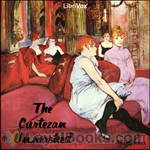 The Curtezan Unmasked
The Curtezan Unmasked
"The Curtezan unmasked or, the Whoredomes of Jezebel Painted to the Life: With Antidotes against them, or Heavenly Julips to cool Men in the Fever of Lust" is a fire-and-brimstone polemic by "A Spiritual Physician" to persuade young men not to succumb to harlotry and its accompanying perils. (Introduction by Denny Sayers) | |
 The True Life of Betty Ireland With Her Birth, Education, and Adventures. Together with Some Account of Her Elder Sister Blanch of Britain. Containing Sundry Very Curious Particulars
The True Life of Betty Ireland With Her Birth, Education, and Adventures. Together with Some Account of Her Elder Sister Blanch of Britain. Containing Sundry Very Curious Particulars
| |
 The Ghost of Chatham; A Vision Dedicated to the House of Peers
The Ghost of Chatham; A Vision Dedicated to the House of Peers
| |
By: Anthony Collins (1676-1729) | |
|---|---|
 A Discourse Concerning Ridicule and Irony in Writing (1729)
A Discourse Concerning Ridicule and Irony in Writing (1729)
| |
By: Anthony Trollope (1815-1882) | |
|---|---|
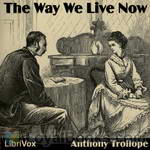 The Way We Live Now
The Way We Live Now
The Way We Live Now is a scathing satirical novel published in London in 1875 by Anthony Trollope, after a popular serialization. It was regarded by many of Trollope’s contemporaries as his finest work. One of his longest novels (it contains a hundred chapters), The Way We Live Now is particularly rich in sub-plot. It was inspired by the financial scandals of the early 1870s, and lashes at the pervading dishonesty of the age, commercial, political, moral, and intellectual. It is one of the last memorable Victorian novels to have been published in monthly parts. | |
 The Eustace Diamonds
The Eustace Diamonds
Lizzie Greystock, a fortune-hunter who ensnares the sickly, dissipated Sir Florian Eustace, is soon left a very wealthy widow and mother. While clever and beautiful, Lizzie has several character flaws; the greatest of these is an almost pathological delight in lying, even when it cannot benefit her. Before he dies, the disillusioned Sir Florian discovers all this, but does not think to change the generous terms of his will. The diamonds of the book’s title are a necklace, a Eustace family heirloom that Sir Florian gave to Lizzie to wear... | |
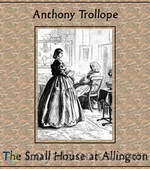 The Small House at Allington
The Small House at Allington
Fifth novel in the Barsetshire series, The Small House at Allington is largely focused on the Small House's inhabitants, Mrs. Dale and her two marriageable daughters, Lily and Bell. The two girls, of course, have suitors: their cousin, Bernard Dale, his friend Adolphus Crosbie, and the local boy, Johnny Eames, whose career in London is to mark him as far more than the "hobbledehoy" that he has earlier been considered. Crosbie is a social climber, and his connection with the dysfunctional de Courcys of Barsetshire give the author a chance for a splendid portrayal of an aristocratic family in decline... | |
 Orley Farm
Orley Farm
Orley Farm is Trollope at his best (as good as the Barsetshire series), which means some of the best characterizations in the English language. Trollope's people are real; the beleaguered Lady Mason, charged with forging a will; the aged lover Sir Peregrine Orme; Madeleine Stavely, deeply but practically in love; the shallow, fickle Sophia Furnival and others are 3-dimensional figures that live and breathe. His satire of the so-called "justice" system is the best kind of satire: he just describes the court proceedings as they really are. The result is as up-to-date as today's newspaper. (Introduction by Leonard Wilson) | |
 Struggles of Brown, Jones, and Robinson
Struggles of Brown, Jones, and Robinson
Billed as a satire concerning the dishonest advertising and business practices of the day, it tells the tale of an upstart clothing business doomed from the get-go to utter failure. Its senior partner (the elderly Brown, who provides the investment) is far too timid for business. His son-in-law (Jones, who runs the store) is stealing from the till, and the junior partner, Robinson (who writes advertisements for the store) is so obsessed with the idea that advertising alone will drive the business, he uses up every last penny of the capital investment in a series of increasingly ludicrous ad campaigns and publicity stunts... | |
By: Anton Chekhov (1860-1904) | |
|---|---|
 The Cherry Orchard
The Cherry Orchard
The Cherry Orchard is Russian playwright Anton Chekhov's last play. It premiered at the Moscow Art Theatre 17 January 1904 in a production directed by Constantin Stanislavski. Chekhov intended this play as a comedy and it does contain some elements of farce; however, Stanislavski insisted on directing the play as a tragedy. Since this initial production, directors have had to contend with the dual nature of this play. The play concerns an aristocratic Russian woman and her family as they return to the family's estate (which includes a large and well-known cherry orchard) just before it is auctioned to pay the mortgage... | |
 Ward No. 6
Ward No. 6
The line between sanity and insanity is blurred in this classic novella by Anton Chekhov. The disillusioned idealist Dr. Rabin is in charge of a provincial lunatic asylum, overseeing with weary, dubious policies a motley group of patients, a group that mirrors in microcosm all of human and especially Russian society. Seeking answers to profound questions, Dr. Rabin enters into dialogues with both staff members and patients, trying to make sense out of what has become of his life, until it becomes less and less clear who is the doctor and who is the patient... | |